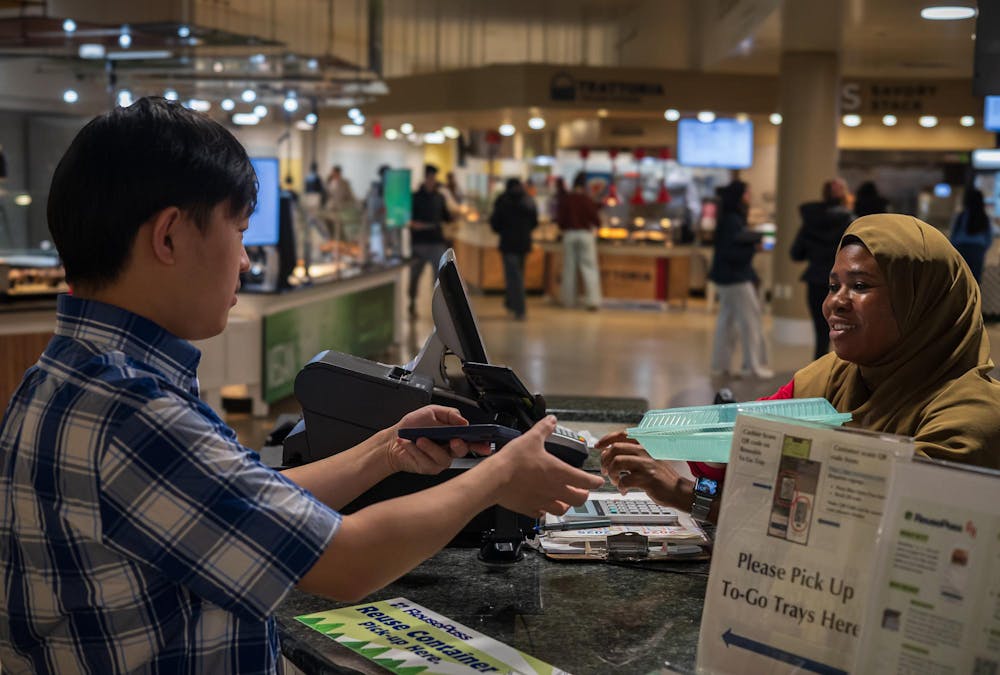Starting this month, U.Va. Dine is now requiring that students use reusable to-go containers at all three dining halls if they wish to take food out. At Gaston Food Hub, reusable to-go containers are offered but not required. U.Va. Dine has partnered with ReusePass, a web-based sustainability program that lets diners check out and return reusable to-go containers, to launch this initiative. The program will aim to reduce waste at dining locations and deliver on the goals of the 2030 U.Va. Sustainability Plan.
While students will still have the option to choose between a reusable and disposable container at Gaston Food Hub, reusable containers are now the only option for to-go meals at the dining halls. Other dining locations, where students can use meal exchanges or flex dollars to purchase meals, will still offer disposable to-go boxes.
In order to use these containers, students must first voluntarily opt into the program by creating a ReusePass account. Students may do this via the ReusePass website, at a U.Va. Dine in-person tabling event or through the GrubHub app. Formerly, dining halls offered reusable containers but did not use the ReusePass app and also offered disposable to-go boxes.
If students have reusable containers checked out, they may check the due dates of their containers on their ReusePass accounts. Their account will also show nearby available drop off locations, located at all three dining halls and Gaston Food Hub.
Some students have found the ReusePass app to be more of an inconvenience than disposable containers were. First-year College student Sreeja Gudiseva said that she has not yet used this new option because the process of setting up an account has dissuaded her from opting for the reusable containers. She said she hopes that the process is made easier going forward, and that some of her friends share her same sentiments.
“If … I don’t have to make an account for it, I would definitely use it,” Gudiseva said. “Because I have to have the whole hassle of setting up the process, it just deters me from wanting to use it.”
Once a container is checked out, students have three days to return their container to a collection bin at any of the dining halls or Gaston Food Hub. After a container is deemed late, students have an extra two day window to return their container, after which they will be liable to a one time fee of $7 per unreturned box, which will be charged to their Cavalier Advantage account.
First-year College student Marco Gori has used the reusable containers twice, once at the Fresh Food Co. in Newcomb Hall and once at Launch in Gaston Food Hub. Gori said using the containers was convenient and that he plans to use them again.
However, he said that it might help to move the drop off bin at the Gaston Food Hub towards the main entrance similar to the drop off bin at Fresh Food Co., instead of at the back of the dining area, to make it easier to return the containers.
“It’s a little out of the way to drop [the containers] off, but I’m interested in using [them] again,” Gori said. “It just makes sense to put [the drop off bins] closer to the main entrance, that way you can drop it as you’re leaving.”
Gori said that this program is a good start to increasing sustainability at the dining halls, but that there could be other options the dining halls could explore to expand this initiative. One example Gori mentioned was the introduction of reusable to-go cups, instead of the disposable cups that are offered at dining locations for to-go meals.
According to University Spokesperson Bethanie Glover, more than 2,200 reusable containers have been checked out and returned since the program was launched earlier this month. In an email statement, Glover said that U.Va. Dine hopes to expand the program in the future, and listed numerous results of the ReusePass partnership.
“The new ReusePass partnership makes the process of participating in the culture of reuse at U.Va. more engaging,” Glover said. “The ReusePass program also allows us to track how many meals are being taken to-go, more accurately meet the needs of students and assess how much waste has been diverted from landfills.”
Last fall at various other schools such as Vanderbilt University and the University of Delaware, the ReusePass program helped save over 53,000 lbs of waste from going to landfills and conserved more than 360,000 gallons of water in total. These results align with the goals of the University’s 2030 Sustainability Plan, which aims to reduce waste and water usage by 30 percent by 2030. According to the U.Va. Dine website, this new initiative will help support the University’s sustainability efforts.
“Choosing a reusable container is a convenient way to take food on the go while minimizing waste and helping U.Va. achieve its sustainability goals,” the website reads.
As of 2023, the University has composted more than 340 tons of food waste and compostable containers. Despite this, the website notes that these reusable containers are even more environmentally friendly than compostable containers.
“Reusable containers help us to reduce our waste profile on Grounds,” the website reads. “...The most environmentally friendly option is to use containers with a longer life cycle.”







